
Hundreds of thousands of people gathered this weekend in cities far from the United States to express anger over the death of George Floyd, a sign that the Black Lives Matter movement against police brutality is resonating with wider calls to address racism from Australia to Asia to Europe.
In Berlin, where police said 15,000 people rallied on the German capital’s Alexander Square, protesters chanted Floyd’s name and held up placards with slogans, such as “Stop police brutality” and “I can’t breathe.”
Floyd, a Black man, died after a Minneapolis police officer pressed a knee on his neck even after he pleaded for air while handcuffed and stopped moving.
“The killing and these violent physical things that have happened is only just the top of it,” said Lloyd Lawson, 54, who took part in the Berlin protest. “That’s why you’ve got to start right from the bottom, just like an iceberg.”
Some 20,000 people rallied in Munich, while thousands more took part in protests in Frankfurt and Cologne.
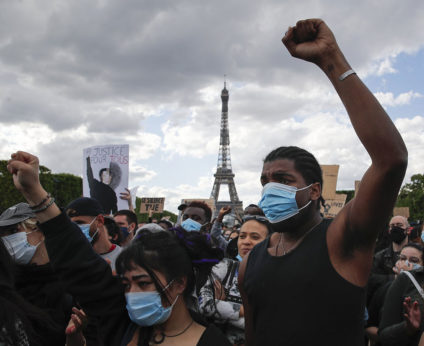
In Paris, several thousand demonstrators ignored a protest ban and assembled within sight of the U.S. Embassy, kept back by imposing barriers and riot police.
Among the crowd in the French capital was Marie Djedje, 14, a Parisian born on July 14, the French national day.
“I was born French, on the day when we celebrate our country. But on a daily basis, I don’t feel that this country accepts me,” she said, holding up a sign that read “Being Black is not a crime.”
The teenager said that emerging from France’s virus lockdown and seeing officers on patrol again drove home how scared she is of the police and how she has steeled herself for a life of overcoming obstacles.
“I know that because of my skin color, I’m starting out with a handicap, for example, if I want to get a flat or go to a top school,” she said. “I know I’m going to have to fight twice as hard as the others. But I’m prepared.”
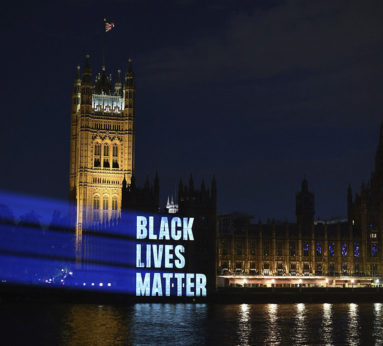
In central London, tens of thousands staged a rally outside Parliament Square, invoking Floyd’s memory as well as people who died during police encounters or indifference in Britain. Some protesters ignored thickening rain clouds and later headed toward the U.K. Home Office, which oversees law enforcement and immigration, and to the U.S. Embassy.
Many dropped to one knee and raised their fists in the air outside the gleaming embassy building south of the River Thames. There were chants of “Silence is violence” and “Color is not a crime.”
“Everyone knows that this represents more than just George Floyd, more than just America, but racism all around the world,” said Darcy Bourne, a London-based student.
The majority of those marching wore masks and other face coverings and appeared to make an effort to adhere to social distancing guidelines by walking in small groups. Andrew Francis, 37, a Black man from London, said there’s “a lot of frustration due to racial discrimination, and we want change for our children and our children’s children to be able to have equality within the U.K, the U.S., all around the world.” Francis, who wore a face covering, said he wasn’t worried about the coronavirus and said the fight for racial equality was “more important” to him.
An estimated 15,000 people gathered in the heart of Manchester, England, while 2,000 people joined in a demonstration in the Welsh capital of Cardiff.
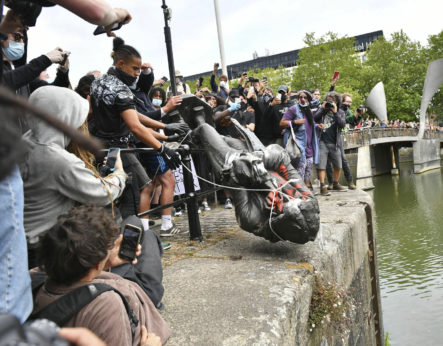
Protesters in the English port of Bristol vented their anger at the country’s colonial history by toppling a statue of a 17th-century slave trader. Demonstrators attached ropes to the statue of Edward Colston before pulling it down to cheers and roars of approval from the crowd.
It wasn’t the only statute targeted on Sunday. In Brussels, protesters clambered onto the statue of former King Leopold II and chanted “reparations,” according to video posted on social media. The word “shame” was also graffitied on the monument, reference perhaps to the fact that Leopold is said to have reigned over the mass death of 10 million Congolese.
Floyd’s death has sparked significant protests across the United States, but it has also struck a chord with minorities protesting discrimination elsewhere, including demonstrators in Sydney and Brisbane who highlighted Indigenous Australians who died in custody.
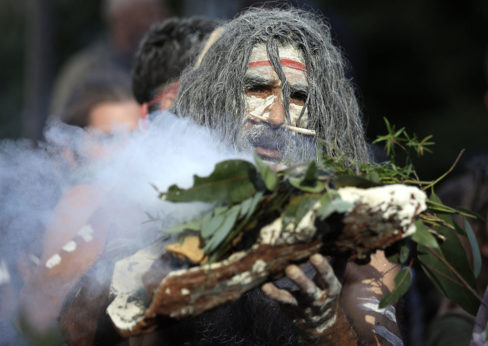
Indigenous Australians make up 2% of the country’s adult population, but 27% of the prison population. They are also the most disadvantaged ethnic minority in Australia and have higher-than-average rates of infant mortality and poor health, as well as shorter life expectancies and lower levels of education and employment than other Australians.
In South Korea’s capital, Seoul, protesters gathered for a second straight day to denounce Floyd’s death. Wearing masks and black shirts, dozens of demonstrators marched through a commercial district amid a police escort, carrying signs such as “George Floyd Rest in Peace” and “Koreans for Black Lives Matter.”
In Senegal, people staged a protest in front of the African Renaissance Monument in the capital of Dakar, holding placards with slogans such as “Enough is enough.”
Chris Trabot, who works for Paris City Hall, said George Floyd’s death last week triggered his decision to demonstrate Saturday for the first time in his life.
Born in the French territory of Martinique, Trabot said he first experienced racism as a child when he moved with his family to mainland France and got in frequent fights with white kids who mocked his skin color. Recently, his 9-year-old daughter has told him of being a target of racism, too, with schoolmates mocking her hair.
Adele Letamba, a 39-year-old consultant protesting in Paris, put it bluntly: “The death of George Floyd was the spark that spread across the world.”
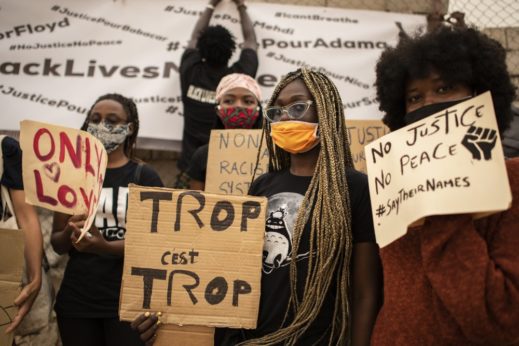
In Tel Aviv, thousands of protesters joined a Jewish-Arab rally against the Israeli government’s plans to annex parts of the occupied West Bank. The protesters wore masks, but social distancing measures were not strictly maintained as some demonstrators formed small groups. Police initially sought to block the rally, but later allowed it to take place.
Protesters in Israel also demonstrated against what they see as excessive violence by Israeli police against Palestinians. One protester held a poster showing George Floyd and Eyad Halak, a Palestinian with autism who was killed last week by Israeli police officers after apparently being mistaken as an attacker.
In Hong Kong, about 20 people staged a rally in solidarity with the Black Lives Matter movement on Sunday outside the U.S. Consulate in the Chinese city. “It’s a global issue,” said Quinland Anderson, a 28-year-old British citizen living in Hong Kong. “We have to remind ourselves despite all we see going on in the U.S. and in the other parts of the world, Black lives do indeed matter.”
Hundreds of demonstrators took to the streets in downtown Rio de Janeiro, Brazil, to protest against racism and police killings of black people on Sunday. The protesters weren’t just joining protests against Floyd’s death in the U.S., but also denouncing the killing of black people in Rio’s favelas.
The most recent case was João Pedro Pinto, 14, who was inside his house on May 18 in São Gonçalo, a city in Rio’s metropolitan area, when police chasing alleged drug traffickers shot into the house. The protesters on Sunday carried banners reading “Black mothers can’t stand crying anymore.” In São Paulo, another demonstration ended with clashes between a small group of protesters and the police.
A rally in Rome’s sprawling People’s Square was noisy but peaceful, with the majority of protesters wearing masks. Among those present was 26-year-old Ghanaian Abdul Nassir, who is studying for a master’s in business management at one of the Italian capital’s public universities.
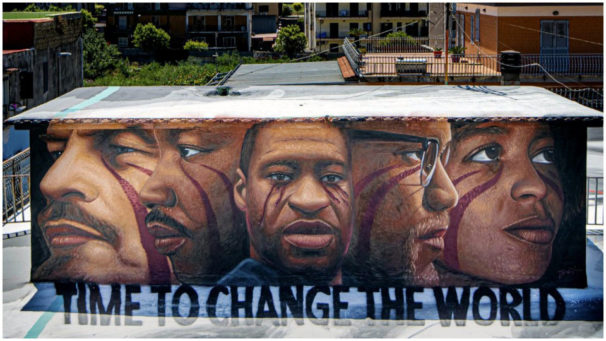
“It’s quite unfortunate, you know, in this current 21st century that people of color are being treated as if they are lepers,” Nassir said. He said he occasionally has felt racist attitudes, most notably when riding the subway.
“Maybe you’re finding a place to stand, and people just keep moving (away) and you’ll be, like, ‘What?’” Nassir said: “We’re strong people but sometimes everyone has a limit.”
At one point, the protesters, most of them young and some with children or siblings, took the knee and raised a fist in solidarity with those fighting racism and police brutality.
In Italy’s financial capital, Milan, a few thousand protesters gathered in a square outside the central train station Sunday afternoon. Many in the crowd were migrants or children of migrants of African origin.
In Spain, several thousand protesters gathered on the streets of Barcelona and at the U.S. Embassy in Madrid. Many in Madrid carried homemade signs reading “Black Lives Matter,” “Human rights for all” and “Silence is pro-racist.”
“We are not only doing this for our brother George Floyd,” said Thimbo Samb, a spokesman for the group that organized the events in Spain mainly through social media. “Here in Europe, in Spain, where we live, we work, we sleep and pay taxes, we also suffer racism.”
___
Associated Press journalists Rick Rycroft in Sydney; Dennis Passa and John Pye in Brisbane; Kim Tong-hyung in Seoul, South Korea; Frank Jordans in Berlin; John Leicester in Paris; Pan Pylas in London; Shlomo Mor in Tel Aviv; Yuri Kageyama in Tokyo; Frances D’Emilio in Rome, Joseph Wilson in Barcelona, Spain; Katie Tam in Hong Kong; Frank Griffiths in London; Daniel Cole in Marseille, France; and Marcelo de Sousa in Rio de Janeiro contributed to this report.










